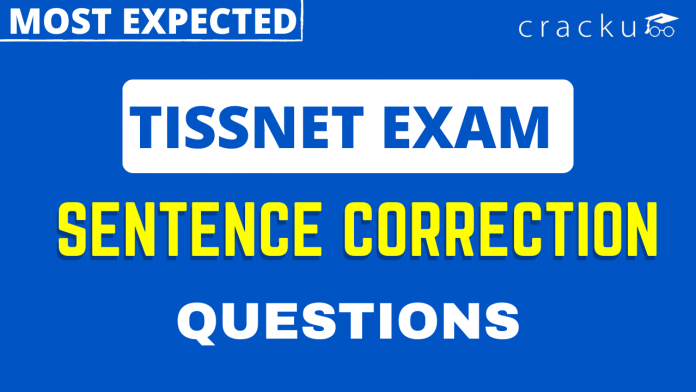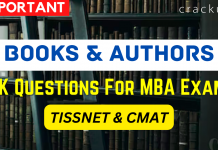Sentence Correction Questions for TISSNET
Download Sentence Correction Questions for TISSNET PDF – TISSNET Sentence Correction questions PDF by Cracku. Practice TISSNET solved Sentence Correction Questions paper tests, and these are the practice question to have a firm grasp on the Sentence Correction topic in the TISSNET exam. Top 20 very Important Sentence Correction Questions for TISSNET based on asked questions in previous exam papers. The TISSNET question papers contain actual questions asked with answers and solutions.
Download Sentence Correction Questions for TISSNET
Enroll to TISSNET 2023 Crash Course
Question 1: Choose the correct preposition to complete the sentence:
Roopam hasn’t seen her father_______________ last September.
a) on
b) in
c) for
d) since
1) Answer (D)
Solution:
A. “on” is used when a specific date or day is mentioned. For example, “on Saturday”.
B. “in” is used with a specific period of time. For example, in a year, in a week, etc.
C. “for” is used when a specific time period is mentioned. For example, “for a year”
D. “since” is the correct answer as it is used with the starting of a particular period. For example, since last summer, since yesterday.
Question 2: Choose the correct verb form to fill in the blanks:
That there would be thunderstorm today was ______by the weather experts.
a) foretold
b) foreteld
c) fortelling
d) foretell
2) Answer (A)
Solution:
By reading the sentence, we can observe that it is in the past tense. The past form of “foretell” is “foretold”.
Hence, the answer is option A.
Question 3: Find the correctly spelt word.
a) Klaptomania
b) Klepptomania
c) Kleptemania
d) Kleptomania
3) Answer (D)
Solution:
The correct word is “Kleptomania” which means “a recurrent urge to steal”. Hence, the answer is option D.
Question 4: Choose the correct alternative to replace the italicized phrase in the following sentence. In case no improvement is needed, option ‘4’ is the answer. I cannot force her to marrying.
a) to marry
b) in marrying
c) for marry
d) No improvement needed
4) Answer (A)
Solution:
In the given sentence, the object is of the form “to + infinitive”. The infinitive is always the first form of a verb. Hence, correct alternative is “to marry”.
Question 5: Identify the correct direct speech form of the following sentence:
My teacher told me that I am not working hard.
a) My teacher told to me, “You are not working hard.”
b) My teacher said, “You are not working hard.”
c) My teacher said to him, “I am not working hard.”
d) My teacher said to me, “You are not working hard.”
5) Answer (D)
Solution:
Option A is incorrect as it cannot be told to me. It should be either told me to said to me.
Options B and C doesn’t give the same meaning as the given sentence. In option B, it doesn’t refer you to anyone in particular. Therefore, the meaning doesn’t remain the same.
Option D is the correct direct speech form.
Answer is option D.
Question 6: Pick the appropriate meaning of the underlined phrase in the following sentence: “You can be happy only when following the golden mean.”
a) opulent way of life
b) middle path
c) golden path
d) meanness
6) Answer (B)
Solution:
The phrase “to follow the golden mean” means to do things in moderation and avoid the extremes. In other words, it means to follow a middle path. Hence, the answer is option B.
Question 7: Pick the correct option:
(I) It is nothing else than pride.
(II) It is nothing else but pride.
a) (I) is correct but (II) is incorrect
b) (I) is incorrect but (II) is correct
c) Both (I) & (II) are correct
d) Both (I) & (II) are incorrect
7) Answer (B)
Solution:
Out of the two given sentences, (ii) is the correct one because “else” is used with “but”.
Hence, the answer is option B.
Question 8: Pick the correct sentence:
a) He made a fool of certainly himself.
b) Certainly he made a fool of himself.
c) Certainly a fool he made of himself.
d) He made a certainly fool of himself.
8) Answer (B)
Solution:
The grammatically correct sentence among the options is B: ” Certainly he made a fool of himself.
“Certainly” is used to emphasize something.
Question 9: Pick the appropriate meaning of the underlined phrase in the following sentence:
“In market economy capital gets lion’s share in production.”
a) adequate part
b) lesser part
c) larger part
d) None of these
9) Answer (C)
Solution:
The phrase “the lion’s share” means “a bigger portion”. Out of the options, C gives the correct answer.
Question 10: Pick the appropriate meaning of the underlined idiom in the following sentence:
“The lease of our premises has run out.”
a) Enfeebled
b) Expired
c) Increased
d) Prolonged
10) Answer (B)
Solution:
A. “Enfeebled” means to become weak.
B. “Expired” means to end.
C. “Increased” means to become greater in size/value.
D. “Prolonged” means to be increased.
In the given sentence, the phrase “run out” means to come to an end. Out of the options, B is the correct answer.
Question 11: Please fill the blanks with the help of correct word from pairs given below and complete the sentence:
(elicit / illicit; council / counsel; hoard / horde; dependents / defendants)
(a) He was charged with _______ sale of narcotics.
(b) The Chief Minister was given a ________ to keep off the epidemic.
(c) A _________ of terrorists have attacked the army base.
(d) The _________ of the university employees are granted full free-fellowship.
a) (a) Elicit; (b) Council; (c) Hoard; (d) Dependents
b) (a) Illicit; (b) Council; (c) Horde; (d) Defendants
c) (a) Elicit; (b) Counsel; (c) Hoard; (d) Defendants
d) (a) Illicit; (b) Counsel; (c) Horde; (d) Dependents
11) Answer (D)
Solution:
a. “elicit” means “to evoke a reaction” while “illicit” means “illegal/forbidden by law”. For the given sentence, “illicit” is the right choice.
b. “council” means “a group of people selected for a certain administrative job”, whereas a “counsel” means “to give advice”. Concerning the given sentence, “counsel” is the correct choice.
c. “hoard” means “to store”, and “horde” means “a large group of people”. Thus, “A horde of terrorists” will be the correct phrasing.
d. “The dependents of the university employees” is the right choice for the given sentence.
Hence, the answer is option D.
Question 12: Spot the Error.
The media was wrong regarding the assumptions made about the accused. No Error.
a) the assumptions made
b) was wrong
c) about the accused
d) No Error
12) Answer (B)
Solution:
The section of the sentence with an error is “was wrong”.
The correct use would be “was in the wrong”.
Hence, the answer is option B.
Question 13: Fill in the blank to complete the sentence:
In an age _____ technology can solve so many problems, is the human element still
needed?
a) of
b) when
c) where
d) as
13) Answer (B)
Solution:
The sentence talks about the “age”, which refers to a period. Hence, among the options, B is the best choice for the answer.
Question 14: Fill in the blank/s to complete the sentence:
He confided ___ her and relied ___ her for keeping his secret.
a) in; on
b) of; upon
c) of; on
d) to; upon
14) Answer (A)
Solution:
The prepositions that are used with “confided” and “relied” are “in” and “on”, respectively.
Hence, the answer is option A.
Question 15: Fill in the blank/s to complete the sentence:
70 percent of the planet is covered ____ ocean.
a) with
b) from
c) by
d) of
15) Answer (A)
Solution:
Among the options, “with” and “by” are the only suitable ones.
“covered by” is used when the object covering the entity encompasses it so that it is not visible.
“covered with” is used to mention a large portion of an entity covered by an object.
Hence, the answer is option A.
Question 16: Fill in the blank/s to complete the sentence:
Climate change is a long-term shift in _________ and _________ climate patterns.
a) global; regional
b) time; space
c) land; water
d) temporary; permanent
16) Answer (A)
Solution:
Among the options, the most suitable words for the given sentence are “global” and “regional”.
Hence, the answer is option A.
Question 17: Spot the Error.
The turn was a blind spot and many accidents occurred there. No Error.
a) many accidents occurred there
b) The turn was
c) No Error
d) a blind spot
17) Answer (C)
Solution:
The sentence is grammatically and syntactically correct.
Hence, the answer is option C.
Question 18: Fill in the blank/s to complete the sentence:
The horrid tasting medicine cured the boy ___ his annoying habit ___ biting his nails.
a) from; of
b) of; of
c) for; of
d) through; for
18) Answer (B)
Solution:
Since the habit and nails belong to the boy, we have to use words which show possessiveness to the boy.
Hence, the suitable choice is option B.
Question 19: Spot the Error.
He has won more medals than them. No Error.
a) more medals than
b) No Error
c) has won
d) them
19) Answer (D)
Solution:
The sentence should have been, “He has won more medals than they.”
Hence, the answer is option D.
Question 20: Each of the sentence below is written twice using an inappropriate and an appropriate word highlighted in black and italicized. For each pair of sentences, identify the sentence with the appropriate word usage from the options given below:
I. Temperatures this week are expected to be seasonal.
II. Temperatures this week are expected to be seasonable
III. The only route was along a narrow tortuous road.
IV. The only route was along a narrow torturous road.
V. The idea was greeted with strong censor.
VI. The idea was greeted with strong censure.
a) The sentences with appropriate word usage are I, III, V
b) The sentences with appropriate words usage are II, IV, VI
c) The sentences with appropriate words usage are I, IV, V
d) The sentences with appropriate words usage are II, III, VI
20) Answer (D)
Solution:
“torturous” means “causing suffering”, whereas “tortuous” means “with twists and turns”. Thus, relating to roads, “tortuous” is the right choice.
“To censor” means to remove or block, whereas “to censure” means “to criticise”. Thus, in the context of the sentence, “censure” is the right choice.
Hence, option D is the answer.





